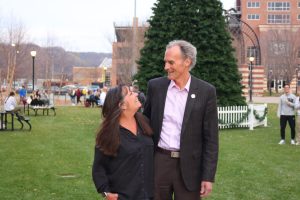UWL Student Association takes steps to ban plastic straws

retrieved from fastcompany.com
September 25, 2018
This past summer brought to the surface conversations in our nation about recycling and plastic waste – particularly plastic straws and their impact on the environment.
According to the National Park Service’s “Be Straw Free Campaign”, every day Americans use and dispose of 500 million plastic straws. In an attempt to scale back the negative effects of disposable straws, various companies around the nation have dedicated themselves to eliminating the usage of plastic, single-use straws.
Airlines such as American and Alaska Airlines, hotels including Hyatt and Hilton, and the coffeehouse chain Starbucks have all made statements committing themselves to removing plastic straws from their business operations.
Even governments such as the city of Seattle and the state of California have made steps to ban plastic straws. On Sept. 20, California Gov. Jerry Brown signed a new law into effect which will only allow sit-down restaurants to offer plastic straws if they are requested.
This fall, UW-La Crosse will join efforts to reduce the usage of plastic straws as well.
The University of Wisconsin-La Crosse’s Student Association President and Vice President, Ben O’Connell and Haley Jurecki, proposed the removal of plastic, disposable straws from the U during their campaign last spring. Over the summer their initiative, alongside others like it in our country, gained momentum.
In a statement they explain that, along with their new Sustainability Cabinet Director, they introduced a resolution to Student Association which would permit a referendum on the fall ballot asking students to vote on whether they would approve of the change.
At the Student Association meeting, there was disagreement over the language of the referendum and whether it would be appropriate to explicitly state that straws are only available for those who have accessibility needs. Some senators had concerns over the extent to which individuals would have to prove their need to use disposable straws and the anxiety that this would cause students who are differently abled.
This echoes the concerns that the nation has highlighted in the wake of a movement that some critics call an environmental fad. Many have questioned whether those with disabilities will be ridiculed for their usage of plastic straws. Companies who have proposed to eliminate straws have responded by ensuring that those who request straws are able to use them.
In the end, senators elected that the wording should allow anyone who requests a straw be given one without any kind of verification given that they need it for accessibility reasons.
Students can share their voice on the Oct. 2 referendum regarding the presence of straws at UWL.





